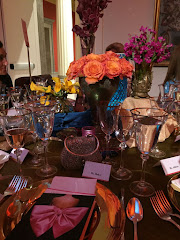By nature, of course, we all want a sense of "belongingness" and purposeful living for ourselves, our families and we aspire to a better life for our children and grand children. Traditionally, the 'Golden Rule' is: "He who has the most gold rules."
Grown out of the American Gilded Age, selective social lists in America, signified instant inclusion into exclusive societies within golden cities such as Baltimore, Boston, Cincinnati, New Orleans, New York, Philadelphia, San Francisco and New York. These lists were so popular, families would often spend their whole lives trying to get onto these lists so they could be considered "In Society." However, in our modern, technology savvy, Internet driven, international, multiple cultural society of 2012, do these formerly WASP (White Anglo-Saxon Protestant) high society lists still apply?
The
New York Social Register, first published in 1886, is a suede navy blue directory of families from 'old money', mostly descendants of the Dutch and English settlers of New York. The
Mayflower Society has its "Blue Book" too, and Washington D.C. society has its "Green Book." Does being included in these annual social books help one's financial and cultural upward mobility, happiness factor, self-confidence and sense of worth, or, are the inclusion in these directories now non-applicable?
The Green Book was expanded in 1930 by Helen Ray Hagner. Her Aunt, Bell Hagner, was Mrs. Theodore Roosevelt's Social Secretary, the first White House Social Secretary in American history. Helen Hagner realized with each election, new government officials were ushered into Washington thus needed to be listed so they could be accessed. She added these Diplomats and elected officials to the old society, stayed families that had lived in Washington for many generations.
The famous and most referenced "Blue Book", thought through folklore to be filled with
Blue Bloods, grew out of the original 41 pilgrims that were listed as passengers on the
Mayflower ship which landed in Plymouth, Massachusetts in 1620. These diverse, brave adventurers making this treacherous voyage to a new land were actually regular folks specifically seeking religious freedom, and all signed
The Mayflower Compact, an important part of our Constitution
.
Their trades varied from a copper barrel-maker, an orphan, a wool comber, a Minister, servants, a carpenter, a surgeon, a farmer, a militia officer and a scholar. Half of these passengers died upon landing in America and during their first winter here in this untested land.
Some of the more famous and interesting descendants of the
Mayflower pilgrims include Julia Child the cook, Serena Armstrong-Jones also called Viscountess Linley, Frank Doubleday of Doubleday Publishing, Frederic Church the American painter, Clint Eastwood the actor, all the Baldwin brothers the actors, George Eastman of Eastman Kodak, Charles Dana Gibson of the 'Gibson Girls', John Lithgow the actor, General George McClellan of the Civil War, Adlai Stevenson the intellect, Noah Webster of Webster's Dictionary, William Whitney of the Whitney Museum and New York society philanthropist, and Christopher Reeve the actor.
All in all, the price of gold goes up and down, those with the gold go in and out of society, and the rules of society are always changing and evolving with the times. Welcome Facebook!
Sources include:
www.thegreenbookdc.com
www.societyofmayflowerdescendants.com
www.mayflowerfamilies.com
www.mayflowercompact.com
www.Wikipedia.com












